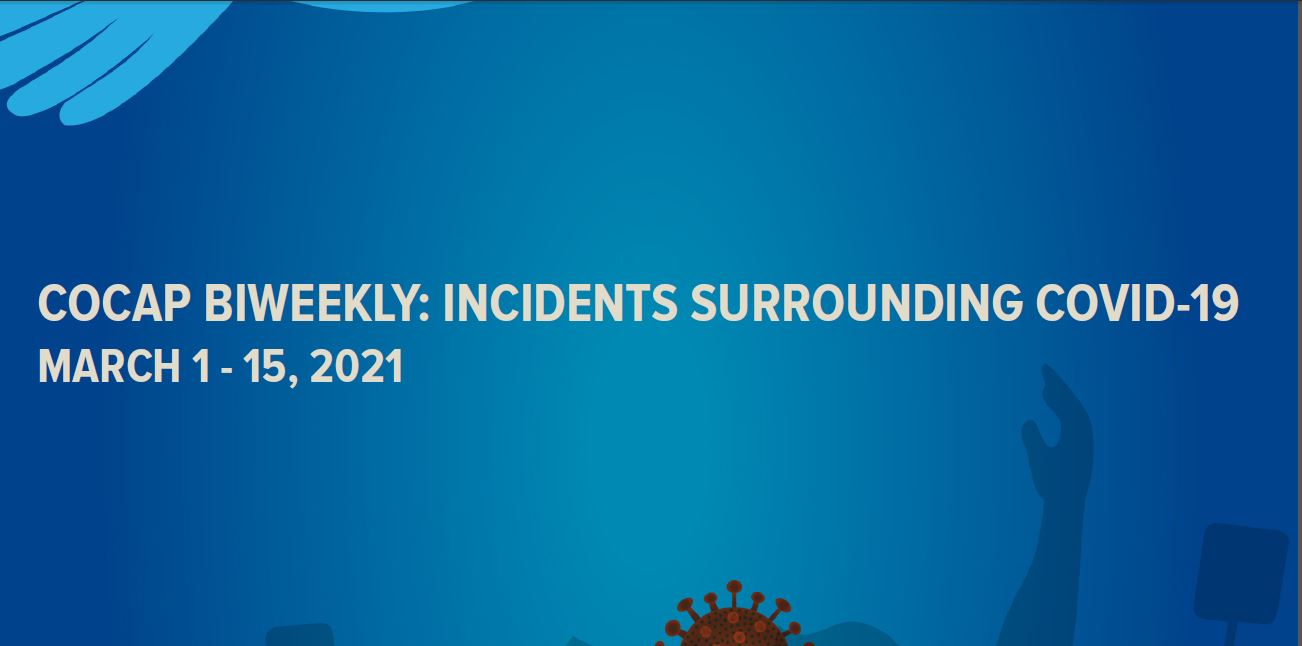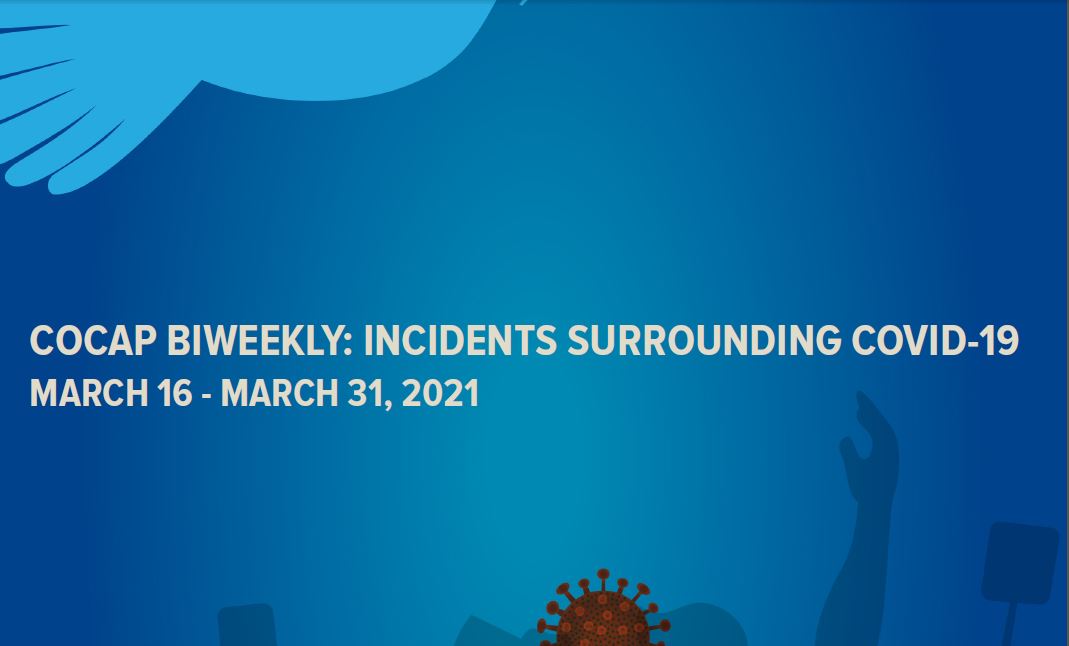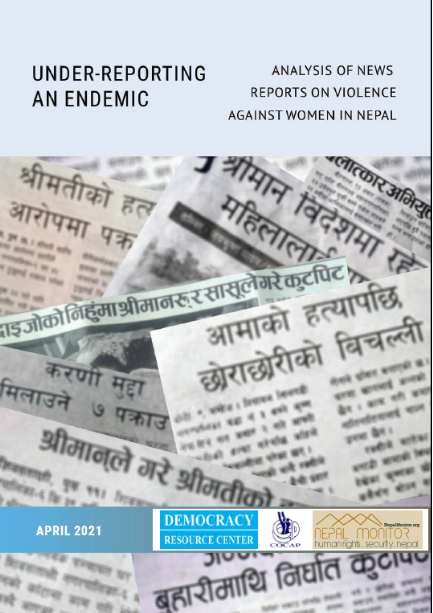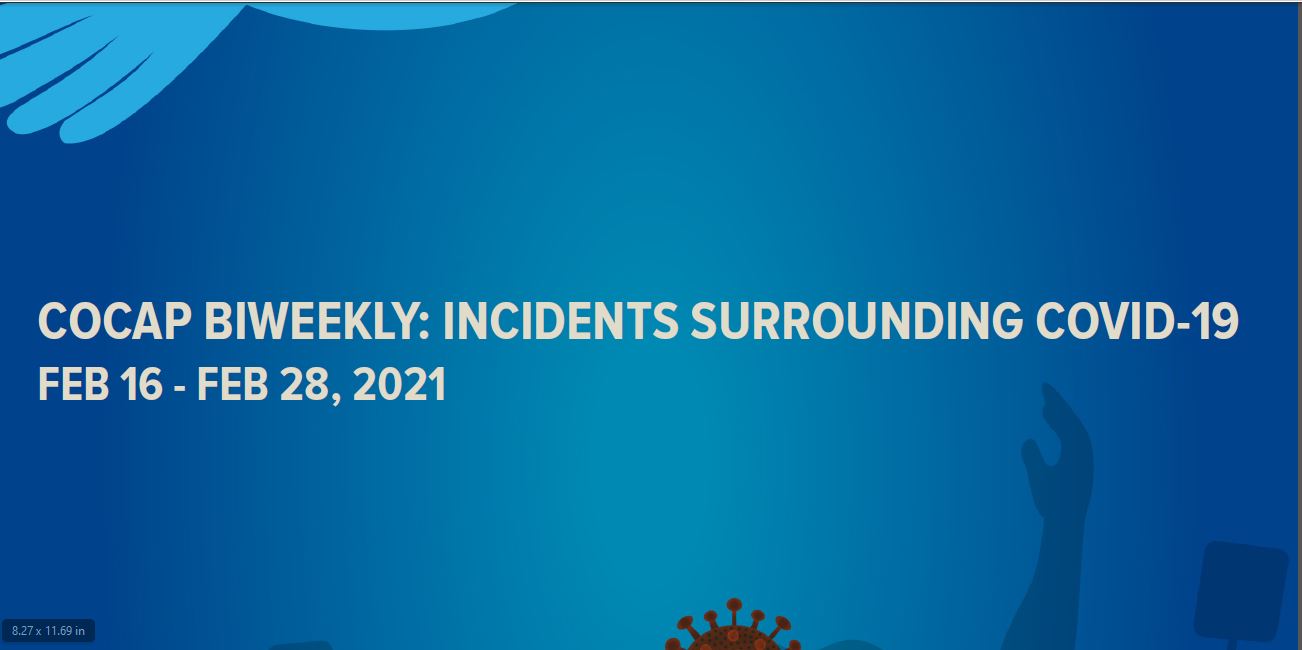Incident Reports
Dalit women in the high risk of rape
2021-10-30
Nepal
Samjhana Kami, a 12-year-old girl of Bajhang Masta rural municipality was raped and murdered by Rajendra Bohra, an 18-year-old by on September 23, 2020. Her body was found near the shed in Shiva temple, semi-naked killed by Trishuli, when her grandfather and mother searched for her. The victim has been sent to the child rehabilitation centre.
Minti Devi, a 40-year-old woman of Rautahat Gadhimai-3, was gang-raped and later murdered by choking with shawl by local Jamsaud Miya, Daud Miya, Jaharudin Miya and Mahammad Esrafal Miya on August 30, 2020. Her body was found by the locals in a sugarcane field and later reported to the police.
Amirka Kumari Dash, a 17-year-old girl of Dhanusha Dhanauji-9, was raped and murdered on September 3, 2020. Her body was found in ditch near the railway and the case is mysterious since the perpetrators have not been found.
A Dalit woman of Musahari Basti in Mahottari was raped while returning from the shopping. When she lodged the complaint, the accused was Mithhilesh Yadav, ward secretary who raped her under the influence of alcohol.
Presented cases are only some examples of the murder after the rape that has been covered by the media. There is the possibility of uncountable similar cases like these are not covered where there is no means of making it public, pressure from the perpetrator and no access in a country like Nepal where the Dalit women are made vulnerable.
Destroying and murdering women after rape has been like a trend and an example of that is Nirmala Panta's, a teenager of Kanchapur, whose perpetrator has still not been found even after three years.
There are plenty of examples where the women who lost their lives due to rape have been found in the fields, sometimes on the banks of rivers and sometimes in temples where they cannot be seen due to the lack of sensitivity of the issue and legal action could not be taken against the culprits. In some cases, the people's representatives and local social leaders have tried to reach an agreement. Such incidents have hindered the prosecution of those involved in rape and murder.
Panchayat's Prapanch, the factory that gives birth to rapists
Angira Pasi, a 13-year-old girl of Rupandehi Dewadaha-11, was raped by Birendra Bhar also known as Koila, by luring her. When the village found out about the rape incident, the Panchayat decided that Birendra should marry Angira and take her as a wife. Angira and her mother were against the decision of the Panchayat but later on, they gave in. The mother of Birendra physically assaulted Angira because she was supposedly from the lower case. Angita was found dead hanging near the riverside by locals on May 23, 2020.
Likewise, Rajendra Bohra, the rapist and the murderer of Samjhana from Bajhang, had raped other local girls before as well. The Father of Rajendra sorted out the case of the rape by giving the victim Rs.500 and restricting her from telling it to others when he found that his son was raping a girl in the flour making place run by water. With increased confidence in this incident, Rajendra raped and murdered the Dalit girl, Samjhana by taking her to the Shiva temple where Dalit people like her were restricted to enter. The real question that lies here is that is the temple open for Dalits is only to be raped and not for Worshipping? No responsible sector has given an answer to this question. The proof for that is the case of physical assault and murder of Bhim Bahadur Bishwakarma in Chitwan just because he said that Dalits should be allowed to worship in Nawami in Dashain.
Panchayat has always uplifted and supported the issue of women and Dalit discrimination. The panchayat and its decisions has been the mirror of patriarchy and hagiarchy on the basis of caste. The panchayat has been proved to be the medium to preserve such illegal activity of rape and murder and has been always supported the idea of marginalizing the Dalit community.
Lack of victim friendly justice system
There is a lack of victim-friendly justice system advocate Kunjan Pyasi claims that even though there is enough law and regulations for the cases of rape and other crimes, the effective implementation is lacking. She said that despite advocating for the perpetrator to be sent to jail, there was no campaign to rehabilitate the victim in the society and its impact on her/him life. She further claims that not mentioning the sexual crime as a psychological disorder is a reason why the rate of these kinds of incidents increase. She says security and privacy standards are needed to enable victimized girls to speak openly.
Criminal incidents against women, Dalits and oppressed communities were already taking place since long but, they did not come out then. For the same reason, crime incidents have become public. That is why the actual graph of those incident has not come out yet.
People view that the women who are under the grave power structure, cannot speak up against such injustice against the rape. The religious aspect which relate women's sexuality as a divine and their dignity, is also one of the reason why women cannot speak up.
There is no access to the justice for Dalit Women
Sona Khatik, a human rights activist, said that the alleged social activists and local leader of the political party had special intervention in the incident. She feels that while prosecuting those involved in the rape of Madhesi Dalit women, such people protect the perpetrators and play a double role. She says that there is irregularity in lodging the complaint against such perpetrators because, when the polic write the complaints they write in their own way and moreover victimize the victim. Khatik concludes that the case is weakened due to poor coordination between the rape victim and the public prosecutor
She feels that the tendency to understand the situation of the Dalit community in the society and to be sensitive to the issue is rarely seen even in the police. Moreover, she said that the treatment of people in the police and administration would weaken the self-confidence of Dalit women and reduce their access. She says that women who understand the situation of the Dalit community in the society have no access to justice. He feels that the tendency to understand the situation of the Dalit community in the society and to be sensitive to the issue is rarely seen even in the police. That is why the Dalit women have little to no access in the Justice.
Rape cases weakened due to lack of evidence
Many criminals have been acquitted due to lack of evidence and witnesses in rape cases. Khatik says that in the case of Dalit women in particular, there are very few witnesses. Her study concludes that the problem is compounded by the tendency to weaken the rape case, acquit the perpetrator, fail to present evidence and ignore existing evidence.
‘When a woman dares to complain that she has been raped, how can she gather evidence and witnesses?’ She says, ‘How can she gather evidence of the pain she has felt? What is the evidence of a heart attack? ' She said that even when the evidence of rape was in front of them, they were looking for evidence and it added more pain to the victim. She says that even those who are ready to testify are reluctant to be witnesses.
Compromise, amnesty - release of rapist
Writer and lawyer Sarita Tiwari says that the rape victim has been pressured to withdraw the case due to security threat. She says the pressure to reconcile with the perpetrator is more frightening than supporting the victim's family for justice. She says that the practice of trying to settle the issue of rape and bargaining has become very frightening. He is of the view that the influence of intermediaries in the field of justice can be assessed by seeing the growth of intermediaries in sensitive issues like rape. There was a case of rape of a Dalit girl but to save the perpetrator, the leaders of various political parties and social leaders were evacuated from the village. No one knows where or in what condition they are.' Fear, intimidation and displacement in case of inability to reach a compromise is considered as evidence that the judiciary has become a place for easy shopping, she said. She claims that the judiciary has been made a game of commission. "If the perpetrator is close to power and money, then the victim is weakened,"
Statistics of the Rape
According to the Police Headquarters, in the fiscal year 076-77, there were 485 women in State-1, 288 in State-2, 256 in Bagmati, 161 in Gandaki, 348 in Lumbini, 139 in Karnali and 200 in the Far West. Rape cases have been registered. Similarly, 266 rape cases have been registered in the Kathmandu Valley in a single year. The number of rapes in the country that year is 2144.
Similarly, according to the Dalit Human Rights Book, 2077, published by Samata Foundation Nepal, there have been 117 incidents of ethnic violence and discrimination against the Dalit community in a year. There have been attempts at rape and murder after rape, rape and attempted rape.
Despite being considered the best law for women in South Asia, Nepal Police data shows that an average of seven women are sexually assaulted daily in Nepal. According to the report of Dalit Women's Association, Dalit women and girls are victims in every three incidents. Thus, while women are being raped every day, it seems that it is not enough to just make a law. This means that the path of law enforcement needs to be strengthened.
According to the Dalit Women's Association, only 35.57 percent of the victims of rape and sexual violence are Dalit women. In the last seven months (April-September), there have been 1,276 cases of sexual violence. The report of the association states that Dalit women and girls have been victimized in 454 of them.
One hundred and thirty-four of the victims are girls. Analyzing the data of 61 districts of the state, the report of the Dalit Women's Association has portrayed the reality of inhuman and cruel violence against Dalit women and girls. The Dalit Women's Association analyzed the reports of the Police, Human Rights Commission, INSEC, Women's Commission, various newspapers and organizations.
Related Reports
GBV / Siraha
Complaint lodged against a 30-year-old man on the charge of raping a 13-year-old teenage girl in Siraha
GBV / Okhaldhunga
52-year-old man arrested on the charge of sexually assaulting a 16-year-old teen girl in Okhaldhunga
GBV / Humla
Teen boy arrested on the charge of raping a 40-year-old woman in Humla
GBV / Rupandehi
Complaint lodged against a 22-year-old youth on the charge of raping a minor girl in Rupandehi
GBV / Bhaktapur
25-year-old man arrested on the charge of harassing girl over social media
Related Trend Analysis
Analysis

THE NEPAL PEACE MONITOR ANNUAL REVIEW: 2020
October 25, 2021
Human Trafficking / LGBT+ Rights / GBV / Political / Children’s Rights / Senior Citizens’ Rights / HRD Issues / Human Rights / Interpersonal Violence / Governance / Covid-19 / Civic-Space / PwD
Analysis

COCAP BIWEEKLY: INCIDENTS SURROUNDING COVID-19 MARCH 1 - 15, 2021
March 25, 2021
GBV / Governance / Covid-19
_001.png)




